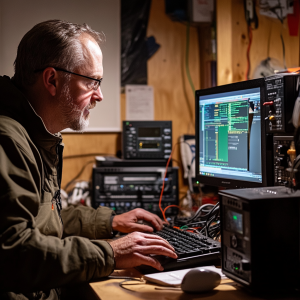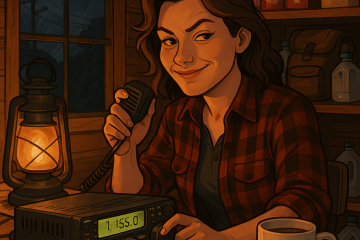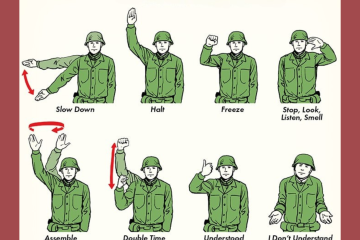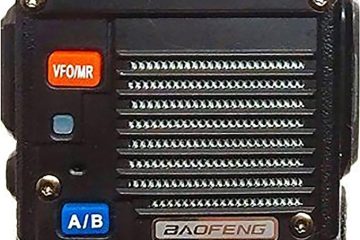
Have planned communication rallying points
Communication Preparedness is the 10th Principle of Preparedness. I realize that I haven’t addressed this topic as extensively as I have the nine other principles, but the truth is, it’s not my forte. Mind you I’m cognitive of needing secret ways to communicate, special words of phrases for everyday safety, and I teach my husband Tagalog, and we’re trying to master the use of Morse Code, but I couldn’t even begin to use his shortwave radio if my life relied on it. In fact, I didn’t even know what a shortwave radio was until I read James Wesley Rawles book, “Survivors” where a character uses it in order to get home from one side of the world to the other. I also feel very intimidated with the HAM radio licensing requirements so I’ve left that up to others. Yup. I’m going to say it, it’s a BIG BAD vulnerability that I’ve left myself exposed to with having to rely on someone else for that type of communication, but I AM working on it. Fortunately, there are lots of other folks out there who are willing to use their expertise to benefit others, and even write a comprehensive book on the matter that will be helpful to even the newest of the newbies. Today, I’d like to tell you about such a resource. Brad Smith is the author of “Are You Radio Prepared?” And he kindly sent me a copy of his book to review. The funny thing is with the holidays and me launching this 100 Days of Prepping, I felt a bit overwhelmed just getting my normal research reading done. But for the past 2 weeks I’ve been inundated with questions from readers and I’d say that about 15% of those messages are coming from folks who are wet behind the ears but wanting to make sure that they have the ability to communicate in a power-down emergency. Well, I have to say that I’d recommend Brad’s book for just about anyone who wants to venture into that aspect of preparedness. Brad covers many of the key basics of getting ready to communicate in a society-down scenario as well as enjoying HAM and shortwave radio communications as a hobby. He tells you what you need to know before purchasing the equipment and provides you with equipment resources. He manages to do so without making you feel like an imbecile–nicely done, Brad–and this coming from a gal who’s too freaked out to try and take the HAM radio class. *grin* (O.k. O.K. before I get an litany of messages from you guys about this, suffice it to say that I only have so much hard drive space on my brain right now, and the thought of adding such technical instructions right now is just more than I want to bite off. Thank You.) The only thing that Brad doesn’t cover in his book is protecting the equipment in the event of a coronal mass injection or an electric magnetic pulse event which would fry much of your equipment. So I’ll simply address it here briefly. Yes, you would need to keep your communications equipment stored in an appropriate faraday cage environment or use the EMP Shield. (Save $50 by putting in the coupon code: PrepPro) A microwave is not suitable as a faraday cage because it would only protect against a specific wavelength. The power brought by an EMP would be too much power for a microwave and too many frequencies. Any gaps in a faraday cage must be significantly smaller than the wavelengths which you’re trying to protect against. So the EMP Shield is much better suited. I’ll write a more detailed article in this 100 Days of Prepping series specifically on faraday cages and specifically on EMPs so you’ll need to be patient on that aspect, but in the meantime, you can take advantage of Brad Smith’s book and get yourself squared away in this aspect of preparedness. I believe that there are a myriad of reasons why this kind of preparedness is necessary for us to have on hand. With the threats of our own government shutting down the internet, with the realization that very few homes actually have a land-line anymore and most of the nation’s population relying on the use of cell phones, there’s every reason to believe that a crisis would cripple us and our ability to communicate. In my opinion, communication is vital to a person’s security and safety. Until tomorrow….
protecting the equipment in the event of a coronal mass injection or an electric magnetic pulse event which would fry much of your equipment. So I’ll simply address it here briefly. Yes, you would need to keep your communications equipment stored in an appropriate faraday cage environment or use the EMP Shield. (Save $50 by putting in the coupon code: PrepPro) A microwave is not suitable as a faraday cage because it would only protect against a specific wavelength. The power brought by an EMP would be too much power for a microwave and too many frequencies. Any gaps in a faraday cage must be significantly smaller than the wavelengths which you’re trying to protect against. So the EMP Shield is much better suited. I’ll write a more detailed article in this 100 Days of Prepping series specifically on faraday cages and specifically on EMPs so you’ll need to be patient on that aspect, but in the meantime, you can take advantage of Brad Smith’s book and get yourself squared away in this aspect of preparedness. I believe that there are a myriad of reasons why this kind of preparedness is necessary for us to have on hand. With the threats of our own government shutting down the internet, with the realization that very few homes actually have a land-line anymore and most of the nation’s population relying on the use of cell phones, there’s every reason to believe that a crisis would cripple us and our ability to communicate. In my opinion, communication is vital to a person’s security and safety. Until tomorrow….



24 Comments
KA0GRC · January 22, 2013 at 8:38 pm
I’ve been a ham for over thirty years, it is a fun hobby as well as useful in a emergency. Since they dropped the code requirement it is easier to get licensed.
Mr. Prepper · January 22, 2013 at 9:02 pm
Comm is a big issue alot of preppers are lacking. I will go with s
gmrs myself. most may not but thats just me. Everyone has a different opinion on this topic.
Kellene Bishop · January 22, 2013 at 9:18 pm
Yeah, that’s what a moron I am with so many aspects of communications–I had to look up what sgmrs were! 🙂
Kellene Bishop · January 22, 2013 at 9:19 pm
Well yes, having the talent to be a comedic ham WOULD come in handy during a crisis. Guess I’m good there. LOL (you know I’m just teasing ya, right?)
Brad Smith · January 22, 2013 at 9:29 pm
Kellene, thanks for reviewing my book! I am like Mr. Prepper, I will be using GMRS for my family. Some other hams in Tulsa and I are setting up a GMRS repeater sometime this year. If anyone has questions, please email me!
Kevin · January 23, 2013 at 12:08 pm
What exactly is GMRS? I am completely unfamilar with this term on working now to develop my communications plan. Thanks in advance for any help you can share
Debbie · January 22, 2013 at 10:26 pm
Sometimes things just blow my mind! Kellene, I didn’t know you and Brad knew each other…Brad and I are members of the same Search and Rescue Team…what a small world! Brad, we need to TALK!
Kellene Bishop · January 23, 2013 at 1:02 am
I actually only “know” Brad through e-mail. But it’s nice to see such a nice small world when access to quality people comes into play, isn’t it?
Jan Springer · January 22, 2013 at 10:41 pm
Awesome post! Brad’s book sounds intriguing. I need to get myself a copy of this book. 🙂
Thanks!
jan
Kathy · January 23, 2013 at 12:33 am
This book is available,
Brad Smith is the author of “Are You Radio Prepared?
at Amazon.com and you may sample read it at Amazon Prime free. THEN, when I like a book there, it goes into my preparedness library. No point in having an e=book that is only available to one person, and then only if the computer is on. My idea is that it’s a good thing to have a hard copy of those books that are worthwhile already in the book case at home. Maybe more than one copy, actually… your bug out location, or bag could use certain information in print.
Keren · January 23, 2013 at 5:18 pm
Just a note, I print my e-Books so that I have a hard copy in my preparedness library. I also print any articles, information, etc. that I believe could be useful sometime in the future. Most of it is from the Preparedness Pro :).
Dick · January 23, 2013 at 1:57 am
Getting a HAM license is easy! The actual questions for the test are published on the internet. All you have to do is memorize the answers to the questions. There are practice tests on the internet you can take until you are ready to take the actual test. If you take the practice tests over and over until you can get an 80 percent on them, you will be ready to take the real test. I have taught over 100 people what it takes to get a license. The youngest student was a 7 year old girl!
Go for it!
Kellene Bishop · January 23, 2013 at 3:10 am
Thanks, Dick. I just might have to NOW! 🙂
Kevin · January 23, 2013 at 12:09 pm
Do you have a good link for the practice questions?
Suzie Q · January 23, 2013 at 2:27 am
Just a thought: Remember the CB radio craze back in the 1970’s and 80’s? Maybe we should go back to that as an emergency source of local communication. Enough people could pass messages among themselves to cover long distances. I still have my single side band base unit (Sears) safely stored away all these years. Only thing is, I don’t know if it still works!!! Just need a tall antennae to be back in business. (used to have a 50 ft tower in my back yard and could broadcast up to 50 miles away before cell phones – we sat on top of a hill then, which helped!!)
Berylsgirl · January 23, 2013 at 5:26 am
Suzie Q my hubby and I think this is an excellent idea and we still have our home bases, mics, and several CBs ready to do into our vehicles. We have told our children to do the same. BUT we also are studying for our Ham Radio Licenses as well because we can be of benefit for those who are trying to reach loved ones long distances away to let them know that they are ok, etc.
Christinebj · January 23, 2013 at 6:09 am
Hey Kellene,
We all have our strengths and our weaknesses. You are super prepared with personal safety and food stuffs. I have my amateur radio license and radios. I only have the first level but that is enough to get on air and talk to the space station if I want… Technician level is pretty easy with very little technical stuff and little math. The other levels I don’t promise they are that easy. Communication has pushed me into guns and concealed weapons… pushed me into more active emergency prep … etc. With all you do this is so easy you should have a technicians lic. let your hubby have the rest. Mine does… then you at least know the protocol for the radio when/if you do have an need to operate it.
Your Friend
Christine
Brad Smith · January 23, 2013 at 2:58 pm
Slight correction, I am not in Debbie’s Search and Rescue but I taught a ham class for them and Debbie’s sister is my pastor’s wife. It’s still a small world 🙂
Brad Smith · January 24, 2013 at 4:22 pm
Kevin, GMRS is General Mobile Radio Service. It is a UHF radio service that shares frequencies with FRS (Family Radio Service). GMRS is part of the Citizens Radio Services with FRS, MURS and CB. A license is required. The fee is $85 for 5 years. You do NOT have to take a test and the license covers you, your family and in-laws. You can legally run 4 or 5 watts handheld and 50 watts at a base station. Repeaters (relay stations) are legal on GMRS and greatly extend the range of handhelds. Contact me if you need more info. brad73 (at) radioprepared (dot com).
Sandy Tamer · January 28, 2013 at 1:41 am
Dear Kellene….just read your article on communications. My husband and I both have our ham license. I have a Tech license and t. Bob has the Extra license and can work all the bands. Had no trouble taking the test for the tech license. In addition to reading the book the arrl ham license manual, I used the QRZ.COM wb site and memorized the practice tests I found that to be most helpful in passing my test. you really want to get your license, in your spare time, ha ha, go to qrz.com and take the practice tests until you can memorize the answers. it was very easy for me to do that. I am happy to know that I can get on the radio and relay messages. We were able to help out during Hurricane Sandy. Sandy in New York
Julie · January 28, 2013 at 10:08 pm
Hi Kellene- A few years ago I had to get my HAM license as part of my job (for Homeland Security of all things!). It was a blessing in disguise as it opened up a whole new world of survival skills. My husband followed suit and has his license now. We are both General licensees, and I had to get mine with Morse Code also. Look into the GMRS realm…I have a friend who has organized most of the neighborhoods in Seattle with repeaters and test schedules. It is quite an impressive setup and will put the power to the people when you know what hits the fan. You have my contact info…touch base if you want more info. Its a very solid solution!
Robert D. Matthews · February 2, 2013 at 2:55 am
Kellene,
A Technician license is not very hard to get…and you can get some pretty cheap dual band (UHF/VHF) radios out of China these days. I just picked up a Baofeng UV-5R for ~$50, which is pretty cheap…
Tim · June 15, 2013 at 6:16 pm
If you can memorize info using flashcards than all 3 ham tests are a snap – I just passed all 3 exams in 30 days by using flash cards. It cost my about $40 all inclusive (tests and flashcard supplies)
In my test sessions were middle schoolers (all 3 did pass) to very senior individuals and both male and females.
Print out the questions (and answers) cut them up and put them on 5×8 index cards and write (or tape) the correct answer on the back – don’t memorize “a” or “b” – memorize the words – the test questions are EXACTLY the same as what you’ll study – the answers are mixed up but the verbage/words are exactly the same.
I watched youtube videos explaining the test questions and answers as I was making the flashcards (made the time go by faster) (and no I don’t know him)
http://dcasler.com/ham-radio/training/
Technician questions and answers are freely available here (as are the other tests) http://www.ncvec.org/page.php?id=349
You do not need any other study materials – print, memorize, test and pass
(I have just ordered some books to learn more about some of the HAM areas that interest me but did NOT need them for the tests)
HAM tests are $15 or less – some clubs offer free tests and you don’t need to be a member of their club to take the test – I took my tests in two different locations and both clubs were great, no one knew me but no one acted like that was unusual – they grade right there and you know within minutes if you passed
Local testing locations “might” be listed here
http://www.arrl.org/find-an-amateur-radio-license-exam-session
I found both of my testing sites by googling “ham radio” (in quotes) then a space and my city (if that doesn’t work use your county)
You do need to register online with the FCC before your test (I did it 2 weeks prior) to get a number called an FRN Number (used in place of a social security number) – this FRN number goes on the FCC application for a license you’ll fill out at the test – go here to get your FRN number
https://apps.fcc.gov/coresWeb/publicHome.do
Now that they sell inexpensive handheld HAM radios for about that same as the FRS/GMRS it just makes sense to go HAM
Even if you are never involved with a local HAM club, the HAMS are involved in every emergency and simply listening in will keep you updated in what’s happening in your area or anywhere in the world (with the correct radios)
I got my HAM license for exactly this reason – I’m a prepper who wants to know what’s happening….
Best Wishes and may we never need our preps…
“At first, the weak perish. Then, the rest fight.”
(recently saw this on a website somewhere and it really stuck with me)
Tim · June 15, 2013 at 6:44 pm
Forgot to mention….
“Most” HAM radios can be modified to transmit/receive outside of the HAM bands/frequencies – it varies based on the radio but “most” will transmit on the FRS/GMRS frequencies (and possibly others) by applying/doing a modification generally referred to as “MARS/CAP Mod” (2 organizations who use frequencies adjacent to the HAM frequencies)
Directions for the modification are widely available on youtube and other websites – some vendors will supply the directions or even do the modification for you before they ship the radio
This way if the SHTF you can talk to your prepper buddies that don’t have HAM radios but do have FRS/GMRS radios.
WARNING – You may not use you HAM radio to talk on any band you aren’t licensed to use nor may you use more power than is legal for a specific band.
These comments and suggestions for the MARS/CAP Mod are for SHTF times ONLY – just because you can do something doesn’t make it legal – find out if the radio you are looking at can be modify if needed, then you can decide if you do or don’t wanna make the modification. If you do make the modification, be sure you know what you can legally do and what you can’t legally do.
Comments are closed.